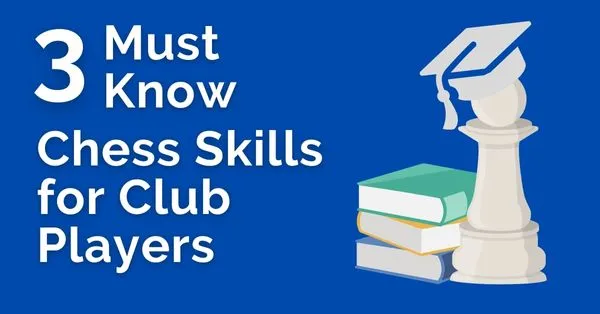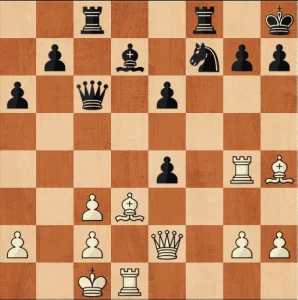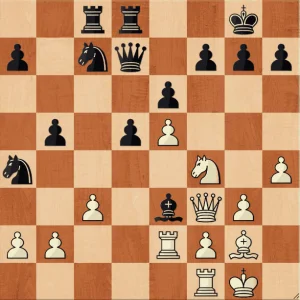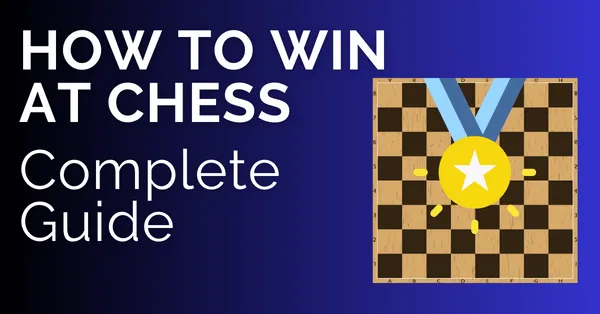3 Must Know Chess Skills for Club Players

For club-level chess players, honing three key skills – Calculation, Decision-Making, and middlegame strategy is paramount. Calculation involves foreseeing potential moves and planning with purpose, while practical decision-making emphasizes making effective moves without fixating on the absolute best continuation. In the Middlegame, understanding concepts like pawn structures and central control becomes crucial.
Improving these skills requires focused training, studying classic games, and practical application. By honing these abilities, club players can significantly improve the level of their game.
In this article, we will take a deep dive into these 3 must-know chess skills for club players and also learn how to improve them.
Calculation
Every chess player wants to know the maximum that Carlsen or Kasparov can calculate. The topic is an enigma for club players. However, if we had to define calculation, we can say that Calculation is the process of looking ahead in the position. So how to start calculating in a position? The first step is to calculate with an aim in mind.
Next would be to look at the forcing moves followed by moves that achieve your aim in the position.
Let’s take a look at the following position.

The aim for white in this position is to attack the black king before black consolidates. Try Calculating as deep as possible.
How to Train Calculation
The concept of Calculation itself is an umbrella of concepts. The main components are
- Visualization
- Candidate Moves
- Forcing Moves
When you train calculation, you can either do targeted training of any of these or combine them.
Tactics is a form of training where you combine all three of them. It may be the most efficient but at times it may not be the most helpful.
For example, to train a Candidate move selection take any dynamic position and then calculate exactly 2 ply in your mind. Now try to identify as many Candidate moves as possible. Now compare your moves with an engine or trainer. With time you can increase the ply count to increase the range of your search.
Decision Making
In Chess, we make decisions at every move. Each decision that we make on the board changes the course of the game for better or worse. Many factors affect decision-making in chess like Knowledge, Emotions, and Pressure. Therefore, it is a complex topic with multiple angles to it.
So how should a club player approach decision-making? Sometimes at the chess board, there are no right or wrong decisions. This is where practical decision-making comes in.
The idea is to make as many good enough moves as possible on the board. That is you don’t have to search for the absolute best continuation at the board at each turn. Such practical decision helps improve your game and time management.
Another aspect of decision-making is the evaluation of the position. We should make decisions on the board only after evaluating the position.
How to Improve Decision Making
A common way to improve decision-making is by solving evaluation exercises. The task is to first evaluate a position and then suggest a continuation for the side to move. In dynamic positions evaluation at sight is not always possible so you have to do quick calculations to get a better idea as to who stands better.
Another way to improve is by studying the books of great players of the past. When you read their thought processes you get a better insight into how a strong player makes practical decisions on the board.
Here’s a Evaluate and find the best move exercise.

Black has just played Bxe3. Evaluate the position for White: Is it Equal, Slightly worse, or Better? Also, suggest which capture is better.
From this example, we can see that both decisions were equally playable in a game but the more practical decision was to accept the weakness and go for an attack. This is because humans cannot defend positions like computers! In other words, you give your opponent more chances to go wrong when they are defending.
Middlegame Strategy
The third crucial skill for any club player is Middlegame Strategy. This encompasses an ocean of concepts and not surprisingly it is where most of the battles are won or lost in club player games.
Middlegame Strategy can be roughly divided into the following sections
- Bishop vs Knight
- Bishop Pair
- Pawn Structures
- Squares and Open Files
- Centre
- Initiative
- Prophylaxis
- Piece Coordination
To go from one level to another a player needs to do two things. The first is to learn a new middlegame concept. The next step is to learn how to apply them in real games. If a player is able to do this subconsciously then that middlegame concept has been well learnt.
A club player has to do this process with a multitude of strategic concepts like Bishop pair, isolated pawn, doubled pawns, Prophylaxis, Piece Exchanges, and many more.
How to Improve Middlegame Play
As the scope of the Middlegame strategy is vast, you can choose any section and choose to work on it. So how to find a subsection to work on? This can be found out by analyzing your games and trying to find weak points.
Now after deciding on what part to work on you can choose to learn the concept via books or online courses.
Nowadays online courses on middlegame strategy are very good in that they provide targeted knowledge for the intended audience.
After learning the concept try applying it in your games. You can also play training games from a position where the concept is applicable.
You also might like 15 Tips to Boost Your Rating Up to 2200 as well as 5 Ways to Improve Your Chess for Under 2000.
Conclusion
The 3 Crucial Skills for club players are like three pillars. A club player’s strength depends upon the strength of these pillars. A player who chooses to work on any of them will definitely see the level of their game improve.
https://thechessworld.com/store/product/powerhouse-skills-for-club-players-with-gm-damian-lemos/










Comments: